Яруу найраг бол хөгжим, уран зурагтай адилхан шууд сонсоод, эсвэл нүдээр хараад танин мэдэж нууц руу нь нэвтрэн орох боломжгүй урлаг юм. Яруу найраг хэлний үзэгдэл учраас заавал орчуулгаар дамжих ёстой. Яруу найрагчийн онгодоос дамжиж, зохиогдсон эх хэлнийхээ зохист аялгуун чанарт шилжсэн яруу найргийг өөр хэлэнд орчуулах нь бараг боломжгүй зүйл хэмээн үзэх үзэл ч байдаг. Гэвч оюун сэтгэлгээний онцгой үзэгдэл болох яруу найраг руу нь нэвтэрэхгүйгээр хүн төрөлхтөн бие биесийн соёлын үнэт зүйлсийг бүрэн дүүрэн танин мэдэх боломгүй юм. Ийнхүү өнөөдөр улс үндэстэн бүхэн орчуулгын яруу найргийн арвин сан хөмрөгийг цогцлоож, тэрхүү “бараг боломжгүй” хэмээн үзэж байсан бэрхшээлийг нэгэнт туулан хэтийджээ.
Монголчууд яруу найргийн онцгой өвөрмөц сэтгэлгээтэй ард түмэн бөгөөд яруу найргийн үлэмж баялаг өв уламжлалтай ард түмэн юм. Хоёрхон үгтэй хос уянгаас эхлээд 20000 мөртэй хөлгөн туульсийг хүртэл өргөн цар хүрээтэй яруу найргийн өв буй. Харамсалтай нь монголын яруу найраг гадаад хэлэнд маш бага орчуулагдсан. Ялангуяа англи хэлэнд орчуулагдсан нь өдрийн од шиг. Чухам яагаад гэдэг талаар маш их тайлбар ярьж болох боловч оршил үгэнд энэ мэтийг нуршихаас түдгэлзэж Монголын яруу найргийн үлэмж баян сан хөмрөгөөс дээжлэн толилуулж буй шинэ ном руугаа анхаарал хандуулъя.
Хоёр мянга таван оны намар Англиас нэгэн захидал интернэтээр хүлээн авлаа. Саймон Вэккхам Смит нэртэй залуу монголын XIX зууны сод хүмүүн, Данзанравжаагрийн яруу найргийг Англи хэлнээ орчуулж буй тухайгаа бичээд холбоо тогтоохыг хүссэн байв. Монголын яруу найраг руу өрнө зүгээс онцгойлон чиглэсэн анхных ч байж болох тэрхүү хандлага нь их үйл явдлыг эхлүүлсэн юм. Бид байнга захидлаар харилцаж байв. Тэр зарим үгийн тайлбарыг хүссэн байдаг, бид хариулсаар., Нэг мэдэхэд нэг жил өнгөрч нэгэн өдөр Данзанравжаагийн яруу найргийн бүрэн эмхэтгэл 15000 орчим мөр шүлгийн орчуулга ирвэй. Бид түүнийг 2006 оны намар Монгол Улсад болсон Дэлхийн Яруу Найрагчдын XXVI их хуралдаа урьлаа. Их хуралд монголын яруу найргаас барьсан бэлэг гэвэл Данзанравжаагийн “Үлэмжийн чанар” яруу найргийн бүрэн түүвэр, монголын эртний яруу найргийн “Эртний сайхан” эмхэтгэл байлаа. Сүүлийн номыг Монголын авъаяслаг орчуулагч Шагдарсүрэнгийн Цог, Саймон хоёр хамтарч орчуулсан юм. Дэлхийн Яруу найрагчдад бидний барьсан бэлэг энэ. Саймон, Цог бидний зүрх сэтгэл монголын яруу найргийг дэлхий дахинд англи хэлээр дамжуулан гаргах үйлсэд нэгэн хэмээр цохилж, хүний хувьд сайхан анд нөхөд, утга зохиолын ертөнцөд хамтран зүтгэгчид болсон юм. Дэлхийн зам дэнхэл донхолтой. Аян замд сайн нөхөр Ш.Цогийгоо алдаж, “Монголын шилдэг яруу найраг” хэмээх энэ цоморлигийг Саймон бид хоёр Улаанбаатар хотноо хамтран бэлтгэж уншигч олондоо өргөн баривай. Бид энэ номоороо авъаслаг орчуулагч Ш.Цогтоо ном-суварга бүтээж байна.
Номын анд, эрхэм нөхөр Саймон Вэккхам Смит бол монголын утга зохиол, түүний яруу найргийн ертөнц рүү гүнзгий сэлж орсон анхны харийн хүн байх. Тэрбээр монгол хэлийг яаж ингэж гүн гүнзгий сурсны учир начир, арга чаргыг би одоо болтол бодоод олдлггүй. Хааяа л ганц нэг үг асууна. Тэр асуултанд түгдрэх тохиолдол ч надад тохиолдож байсан. Ийм авъаслаг орчуулагч Монголын яруу найрагт зочлон ирснийг би мөнх тэнгэрийн таалал хэмээн бодном.
Энд толилуулан буй монголын шилдэг яруу найргийн цоморлигт монголын эртний улс болох Хүннүгийн дуулалаас XX зууныг дуусталх үеийн монгол яруу найргаас сорчлон дээжиллээ. Найраглал, туульс зэрэг томоохон төрөл зүйлийг энд багтаах боломж байсангүй. Бас зарим нэг яруу найргийн шилмэл бүтээлийг орчуулахад цаг хэрэгтэй байв.
Гэхдээ бидний сонголт нүүдэлчин язгууртай монголын ард түмний оюун сэтгэлгээний ертөнц рүү яруу найргаар дамжин “нүүдэллэх” таны зүрх сэтгэлийн аялалыг гайхамшигтай шинэ зүйлсээр баяжуулан цэнгүүлнэ хэмээн баттай итгэж байна.
Саймон бид хоёр Монголын яруу найргийн сонгодог шүлгүүдийг шилэн сонгоход ихэнхдээ санал нийлж байв. Гэхдээ энд сонгодог яруу найраг монголын шилмэл яруу найргийг бүрэн багтааж яахин барах билээ.
Цаана нь нэмж орчуулах олон гайхамшигтай яруу найраг үлдсэнийг хэлэх хэрэгтэй. Энэ мэт ажил нь олон жилийн уйгагүй хөдөлмөр шаардах үйлс юм. Цаашид дахин нэмж сайжруулсаар байх болнон гэдгээ баяртай өчихийн хамт ямар ч байсан олсон олзоо дэлхий дахинтай бушуухан хуваалцах сэтгэлээр энэ номоо яаран уншигч танд толилуулж байна. Танаас урмын сайн үг сонсох аваас энэ үйлсээ цааш цуцалтгүй үргэлжлүүлэхэд бэлэн байгаагаа өчсү.
Үгийн төгсгөлд хэдэн үг хэлсү. Монгол хэлэнд “ор” “орч” хэмээх язгуур буй. Уг язгуураас “орчлон” хэмээх үг үүссэн юм. “Орчлон” гэдэг нь дэлхий ертөнц, гялатикийг хамардаг. Бас “орчих” хэмээх үг ч буй. “Орчих” хэмээх үгийг монголчууд зөвхөн огторгуй тэнгэр од гараг, оюун санааны бүтээлийн тухайд л хэргэлдэг. Монголын өвгө дээдэс “орчуулах” хэмээх үгийг хэрэглэхдээ “нэг хэлнээс нөгөө хэлэнд буулгах ажил лугаа дүйцэх үйлс хэмээн үзэж байсантай холбоотой хэмээн үздэг юм. Хүн төрөлхтөний соёлын нэг тэнгэрээс нөгөө тэнгэр лүү од эрхэсийг зөөж аваачих мэт хэцүү бэрх үйлсийг амжаалсан эрхэм анд Саймон, Цог нартаа монголын яруу найргийн тэнгэрээс баярын цэцэг илгээе.
Уншигч та Монголын яруу найргийн тэнгэрт түгсэн үй түмэн ододоос өөр өөрийн сэтгэлийн тэнгэрт орчих хөдөлгөөн хийж хүлээн авсугай.
2007.6.6
Г.Мэнд-Ооёо
Human knowledge is stretching ever further. But there are many things which lie beyond our knowledge. This is because, when discussing the creative work of poets throughout human history, the world of the mind transcends nationality. Poetry is even today not open, and the world is as it was before.
Like music and fine art, the secrets of poetry cannot directly be penetrated through the aural or through the visual. Because poetry is speech made visible, in order to make it available, we need to translate it. Even to attempt the translation into another language of a poem, which has been formed in the poet’s individuality and which moves to the melodic and rhythmic qualities of its original language, is almost impossible. But poetry is a special way of looking at the world, and it is impossible for human beings fully to grasp the value of their own cultures. Today, then, we have an abundant store of poetry from all over the world, and so in the future we will achieve which we once saw as being “almost impossible”.
Mongolians are a people with a particular concept of poetry, and a rich and broad poetic heritage, stretching from couplets of two words to epics of 20,000 lines. Regrettably, Mongolian poetry has been translated very little into foreign languages. In particular, translations into English are as rare as a star in daytime. Although I could offer an explanation for this, I will refrain in my introduction from such things, and introduce this new book, in which a sample is presented from the rich heritage of Mongolian poetry.
In the autumn of 2005, an email arrived on my desk from England. A young man named Simon Wickham-Smith had written that he had translated into English the poems of the nineteenth century Mongolian Renaissance man, Danzanravjaa. This first indication from the west of an interest in Mongolian poetry was the beginning of something great. I established a rapport with Simon via email, answering his requests for explanations of specific words. And so, one year ago, around 15000 lines of Danzanravjaa’s poetry was published in English translation. We invited Simon to the 26th World Congress of Poets, which was held in Mongolia during the autumn of 2006. From the annals of Mongolian poetry, we published both the collection of Danzanravjaa’s poetry, Perfect Qualities, as well as a selection of Mongolian poetry called Ancient Splendor. This latter book was a joint translation, by Simon and a Mongolian translator, Tsog Shadgarsüren, and it was presented as a s gift to the delegates at the World Congress. Tsog and Simon had published Mongolian poetry for the entire English speaking world and, in so doing, these two friends had together made inroads into the world of literature. But the road through the world is an uncertain one and, in November 2006, Tsog reached the end of his journey. Simon and I have worked together on this book, The Best of Mongolian Poetry, in Ulaanbaatar and, in offering it to our readers, would like to dedicate it as a memorial to the translator Tsog Shagdarsüren.
My good friend Simon Wickham-Smith is one of the first foreigners to have swum so deeply into the world of Mongolian literature and its poetry. Thinking now about how he managed so deeply to study the Mongolian language, I find it both rare and precious. Sometimes, he asks only about a single word. His questions even give me pause for thought. For such a gifted translator to have come to Mongolian poets, I believe, fills Heaven with joy.
For this collection of the best Mongolian poems we have sourced texts from far back as from the ancient songs of Khünnü, as well as from the poems of contemporary Mongolian poets. It has not been possible to include here examples of the highly significant epic poetry, and it will require further time to translate more of the very best work of certain poets.
That said, the traversing by poets of the nomadic mind of the Mongolian people, which constitutes the wonderful work in this new book, will entertain and profoundly enrich the journey of your own mind.
Simon and I have worked together in selecting these poems - although how could a selection be expected to include the full extent of Mongolian poetry? Nonetheless, there are some wonderful poets whose work has been translated here. Work of this caliber requires many years of tireless labor. I should also add that the original text of Ancient Splendor has herein been revised and improved and that the insight we have gained has been quickly incorporated. With this in mind, we have made our book easier for the impatient reader and we guarantee that, trusting in the readers’ good will, our work will continue.
A final word about etymology. In the Mongolian language there is a root, orch. From this word is derived the word orchlong. Orchlong denotes the world, or galaxy. And then there is the word orchikh. For Mongolians, orchikh is concerned with the turning of the mind, and of the sky and the stars and the planets. The Mongolian elders explain the word orchuulakh as being the work of turning one language into another, and of the rotation of the stars and the planets. To understand how these words relate to one another is to understand the earth. To Simon and Tsog, who managed to complete this difficult work, as though translating the heavenly bodies from one sky of human culture into another sky, let us send the rich flowers from the sky of Mongolian poetry.
I hope that you will agree that, from the many stars appearing in the sky of Mongolian poetry, we are led further into the sky of our own minds, and into the minds of others.
Ulaanbaatar
June 6th 2007
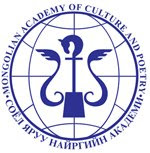




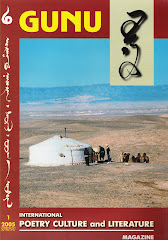
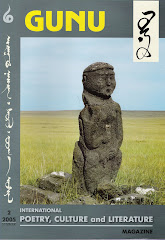
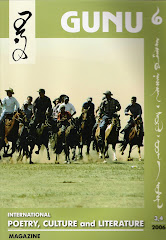



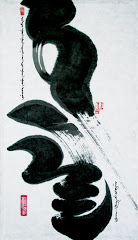
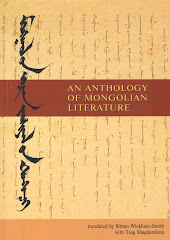
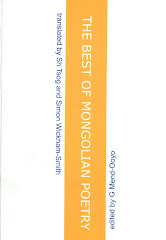


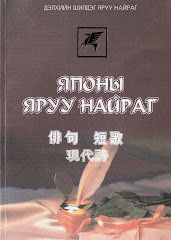

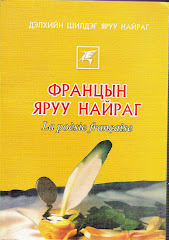
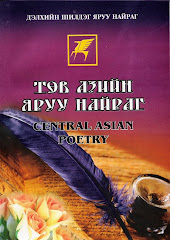
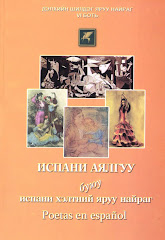
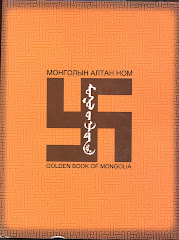
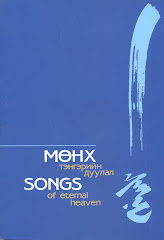
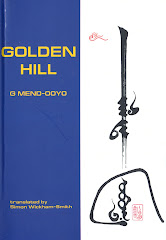
No comments:
Post a Comment